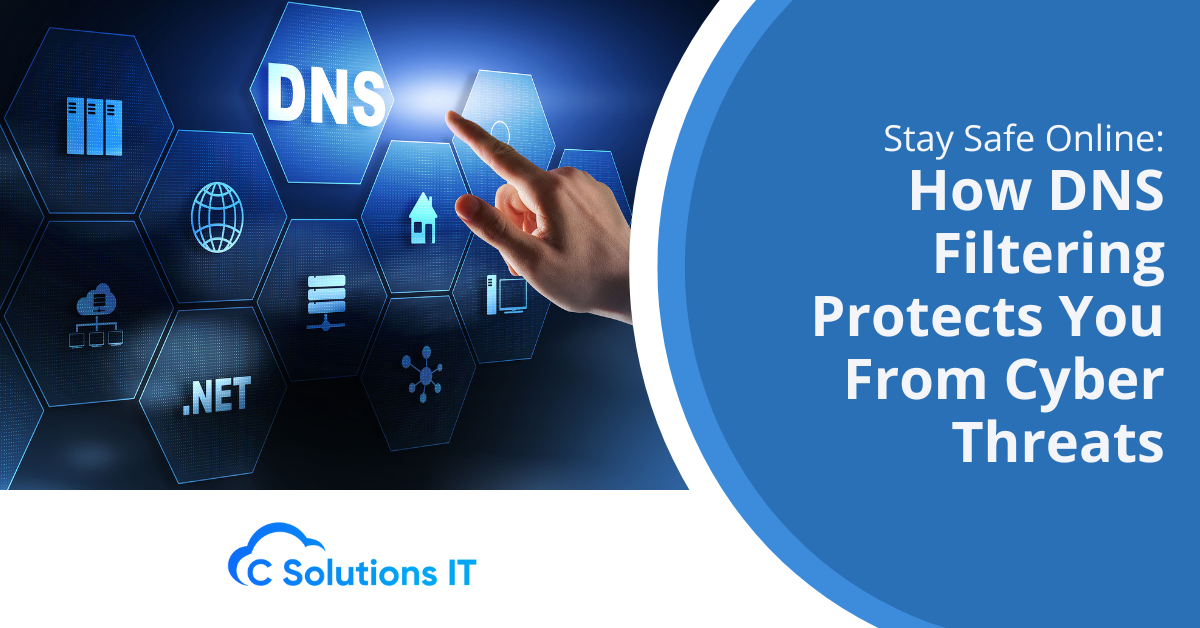Stay Safe Online: How DNS Filtering Protects You From Cyber Threats

The internet has changed the way we communicate and access information, but it has also brought along a host of threats, including malware, phishing, and other cyber-attacks. These threats can result in the theft of sensitive personal information and financial loss.
DNS filtering is a security measure that can protect individuals and businesses from dangerous websites. In this article, we will explore what DNS filtering is, how it works, and the benefits it offers.
What is DNS Filtering?
DNS filtering is a technique used to prevent users from accessing malicious or inappropriate websites. DNS, or Domain Name System, is responsible for translating human-readable website names into IP addresses that computers can understand.
How does DNS Filtering work?
DNS filtering works by intercepting DNS requests and either allowing or blocking them based on a set of predefined rules. When a user types a website name into their browser, their computer sends a request to a DNS server to find the corresponding IP address.
The DNS server then checks its list of allowed or blocked websites to determine whether the request should be allowed or blocked. If the website is allowed, the DNS server returns the IP address to the user’s computer, allowing them to access the website. If the website is blocked, the DNS server returns an error message, preventing the user from accessing the website.
What Types of DNS Filtering Solutions are Available?
There are several DNS filtering solutions available in the market, and choosing the right one depends on the specific needs and requirements of the organization.
The best DNS filtering solution depends on factors such as the size of the organization, the number of users, the level of control required, and the budget. It is essential to conduct a thorough evaluation of the available solutions before choosing one. Here are some of the common DNS filtering solutions:
DNS Filtering as a Service (DFaaS)
This is a cloud-based service where the DNS requests are routed through a cloud-based server that filters out malicious requests. This solution is ideal for small to medium-sized businesses that do not have the resources to manage their DNS servers.
On-Premises DNS Filtering
This solution involves deploying DNS filtering hardware or software on-premises. This solution is ideal for large organizations that have the resources and expertise to manage their DNS servers.
Hybrid DNS Filtering
This solution combines the benefits of both DFaaS and on-premises DNS filtering. This solution is ideal for organizations that want the flexibility of cloud-based solutions but also want the control of on-premises solutions.
Managed DNS Filtering
This solution involves outsourcing the management of DNS filtering to a third-party provider. This solution is ideal for organizations that do not have the expertise or resources to manage their DNS filtering.
DIY DNS Filtering
This solution involves setting up DNS filtering using open-source software. This solution is ideal for organizations that have the expertise and resources to set up and manage their DNS filtering.
What are the Benefits of DNS Filtering?
Protection against Malware
One of the most significant benefits of DNS filtering is its ability to protect against malware. Malware is malicious software that is designed by cyber criminals to disable or damage computers.
Malware can be delivered through malicious websites, and DNS filtering can block access to these websites, preventing users from inadvertently downloading malware.
Protection against Phishing
Phishing is a type of cyber-attack where attackers attempt to steal sensitive details, like credit card numbers and account passwords, by tricking users into providing them. Phishing attacks may also use fraudulent websites that look legitimate but are designed to steal information. DNS filtering can block access to these fake websites, preventing users from falling victim to phishing attacks.
Parental Controls
DNS filtering can also be used for parental controls, allowing parents to block access to inappropriate websites. This can be particularly useful for young children who may not understand the risks associated with certain websites.
Increased Productivity
DNS filtering can also be used in a business environment to increase productivity. By blocking access to distracting websites, such as social media sites, employees can focus on their work and be more productive.
Compliance
DNS filtering is helpful when it comes to ensuring compliance with company policies and regulations. For example, a company may want to block access to certain websites that are not related to work to ensure that employees are not wasting time or engaging in inappropriate behavior.
Get Started with Managed DNS Filtering Today
DNS filtering is a powerful security measure that can protect individuals and businesses from a range of threats, including malware, phishing, and inappropriate content. By blocking access to known malicious or inappropriate websites, DNS filtering can significantly reduce the risk of cyber-attacks and data breaches.
Whether you are a parent looking to protect your children online or a business looking to increase productivity and ensure compliance, DNS filtering is a valuable tool to have at your disposal. If you are interested in implementing DNS filtering in your organization, contact C Solutions IT today to learn more about our services.
